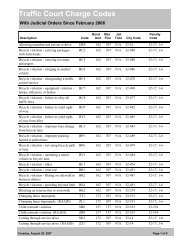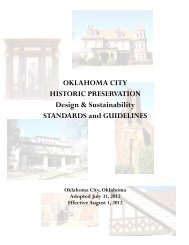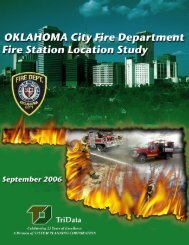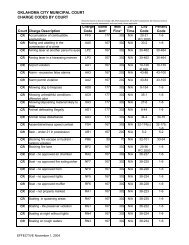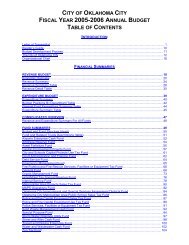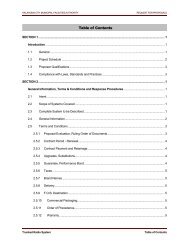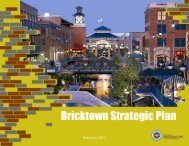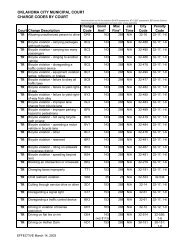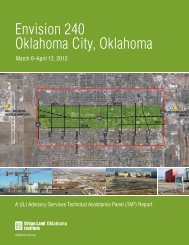OKC Plan, 2000-2020 - City of Oklahoma City
OKC Plan, 2000-2020 - City of Oklahoma City
OKC Plan, 2000-2020 - City of Oklahoma City
Create successful ePaper yourself
Turn your PDF publications into a flip-book with our unique Google optimized e-Paper software.
The <strong>Oklahoma</strong> <strong>City</strong> region is a complex mosaic <strong>of</strong> overlapping governmental units. The<br />
<strong>Oklahoma</strong> <strong>City</strong> metropolitan area, as defined by the U.S. Census Bureau encompasses six counties<br />
and 70 municipalities. In addition, the <strong>Oklahoma</strong> <strong>City</strong> corporate limits include portions <strong>of</strong> some 30<br />
school districts. While the individual interests <strong>of</strong> these governmental units may <strong>of</strong>ten conflict, all<br />
residents <strong>of</strong> the <strong>Oklahoma</strong> <strong>City</strong> region share, for better or worse, a common identity and future.<br />
And yet, competition <strong>of</strong>ten seems to be the prevailing dynamic in the relationship among the<br />
region=s cities, counties, school districts, and other governmental units. Cities and counties compete<br />
with each other to capture the newest and biggest retail businesses and industrial facilities to beef up<br />
their sales and property tax collections. The added revenues are quickly used up in meeting the costs<br />
<strong>of</strong> providing a full range <strong>of</strong> public services—police and fire protection, water supply, sewage<br />
treatment, and road construction and maintenance, to ever growing populations and developed areas.<br />
Despite the many impulses toward competition, the case for regional cooperation is<br />
compelling. Nationally-renowned urban affairs writer Neal Peirce, in his book Citistates, notes that<br />
regions—not cities, counties, or states, have become the primary units which compete in the global<br />
economy. Residents <strong>of</strong> the region are not only citizens <strong>Oklahoma</strong> <strong>City</strong>, Edmond, Norman, Moore,<br />
Midwest <strong>City</strong>, etc. We are all citizens <strong>of</strong> the Central <strong>Oklahoma</strong> Region.<br />
No longer may outlying metro communities claim to be isolated from housing, poverty,<br />
joblessness, and educational problems in the central city. Not only do these problems affect the<br />
entire region’s global competitiveness, but many <strong>of</strong> these “urban” ills are cropping up in the suburbs<br />
as well.<br />
The <strong>City</strong> and its municipal authorities cooperate with other jurisdictions in many ways,<br />
including the provision <strong>of</strong> facilities and services which benefit the region such as water, the zoo, arts<br />
and cultural facilities, roadway improvements, airports, and more. Joint efforts with the Association<br />
<strong>of</strong> Central <strong>Oklahoma</strong> Governments, suburbs, and county governments have helped address many<br />
regional issues, such as 911 phone service.<br />
The <strong>City</strong>’s experience serving 600-plus square miles for more than thirty years gives it<br />
unique abilities and perspectives in dealing with issues over a large and varied area. The <strong>City</strong> can<br />
lend the benefits <strong>of</strong> this experience to region-wide multi-jurisdictional agencies. <strong>Oklahoma</strong> <strong>City</strong>’s<br />
current status as water supplier for much <strong>of</strong> the region, may make it the logical choice to be the<br />
regional water source.<br />
Much potential remains for growth in the city and for cooperative ways to achieve mutually<br />
beneficial development patterns with adjacent communities. The plans <strong>of</strong> all cities in the region<br />
should reflect interdependent cooperation by addressing region-wide issues and relationships with<br />
other cities. Opportunities exist for joint services. Some communities may find a specialized<br />
service niche to fill for other municipalities, such as electricity utility service, code enforcement,<br />
animal control, or construction inspection. Prospects are promising for the reduction <strong>of</strong> competition<br />
and for the positive evolution <strong>of</strong> cooperative arrangements while cities retain unique identities as<br />
separate units.<br />
103



